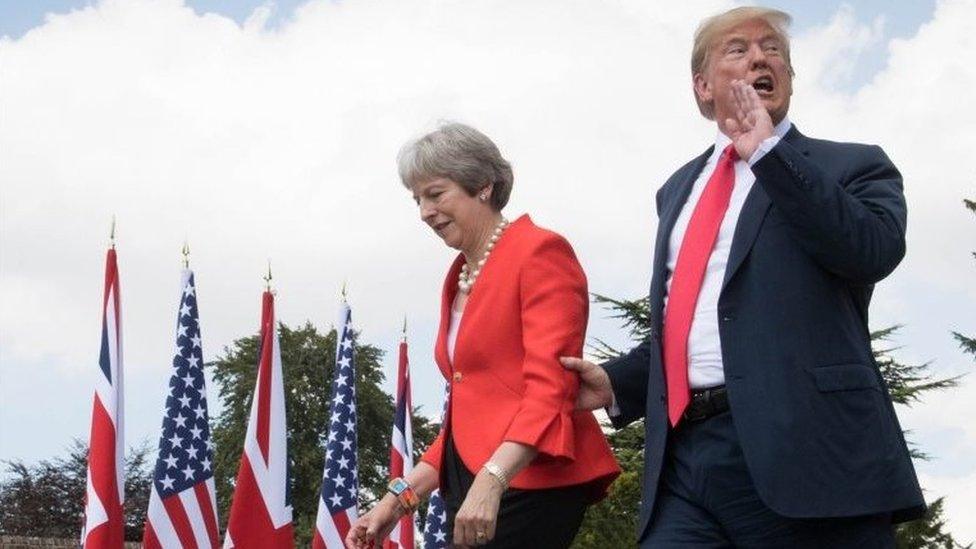Donald Trump UK visit: All you need to know
- Published
The BBC's Jonny Dymond on what to expect from President Trump's visit to the UK
US President Donald Trump and First Lady Melania Trump are making a state visit to the UK from 3 to 5 June. Here's a rundown of what we can expect.
What is a state visit?
It's a formal trip to the UK by a head of state and is normally at the invitation of the Queen, who acts on advice from the government.
Although they're grand occasions, they're not just ceremonial affairs - they're also used by the government to further what it sees as Britain's national interests.
The Queen usually receives one or two heads of state per year and has hosted 112 of these visits since becoming monarch in 1952.
The official website of the Queen and the Royal Family has a full list of all the other state visits, external, and details of how the ceremonies unfold, external.
Visitors usually stay at either Buckingham Palace or Windsor Castle, but because Buckingham Palace is being renovated the US president is not expected to stay there.
While Mr Trump is only the third US president to make a state visit to the UK, the Queen has met almost all the US presidents in office during that time, either in the UK or in the US.
What is happening on the visit?
On Monday, the first day of Mr Trump's three-day trip, a ceremonial welcome attended by the Queen, Prince of Wales and Duchess of Cornwall was held in the Buckingham Palace garden.
After the welcome, the Duke of Sussex joined the group for a private lunch at the palace.
Here's what happened on day one of Donald Trump's state visit to the UK (tweets not included).
Mr and Mrs Trump then visited Westminster Abbey for a tour and met Prince Charles and the Duchess of Cornwall for tea at Clarence House.
A state banquet in the palace's ballroom took place on Monday evening, with Mr Trump, the Queen, Prince Charles and the Duchess of Cornwall joined by the Duke and Duchess of Cambridge, along with other UK public figures and prominent Americans living in Britain.
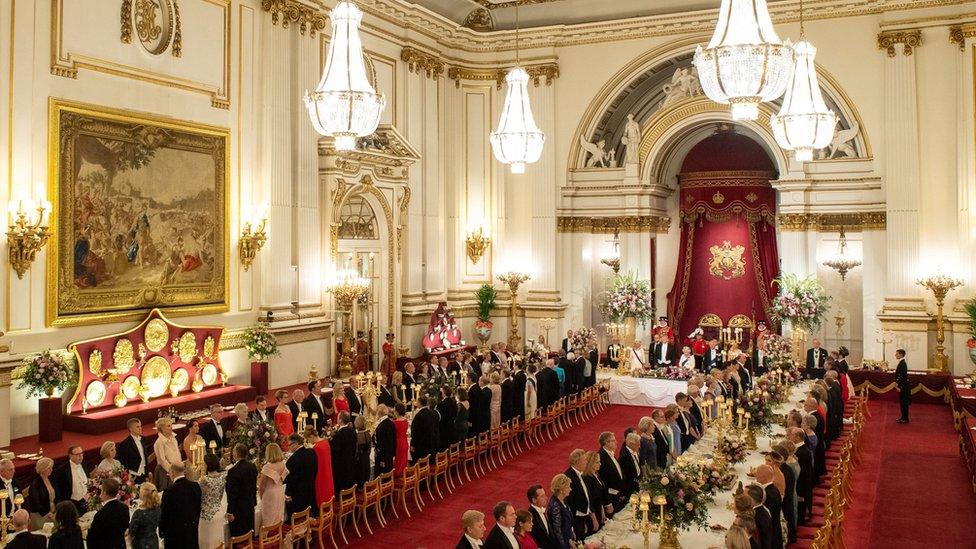
The banquet was held in the ballroom at Buckingham Palace
On Tuesday, Mr Trump and Prime Minister Theresa May will host a business breakfast attended by the Duke of York at St James's Palace.
Business leaders understood to be attending include Barclays CEO Jes Staley, GlaxoSmithKline chief executive Emma Walmsley, BAE Systems chairman Sir Roger Carr and the National Grid's John Pettigrew.
Mr Trump will then visit Downing Street for talks with Theresa May. They are expected to discuss a range of issues on which they hold differing views - including climate change and Huawei.
The talks will be followed by a joint press conference.
Mrs May is due to step down as prime minister on 7 June.
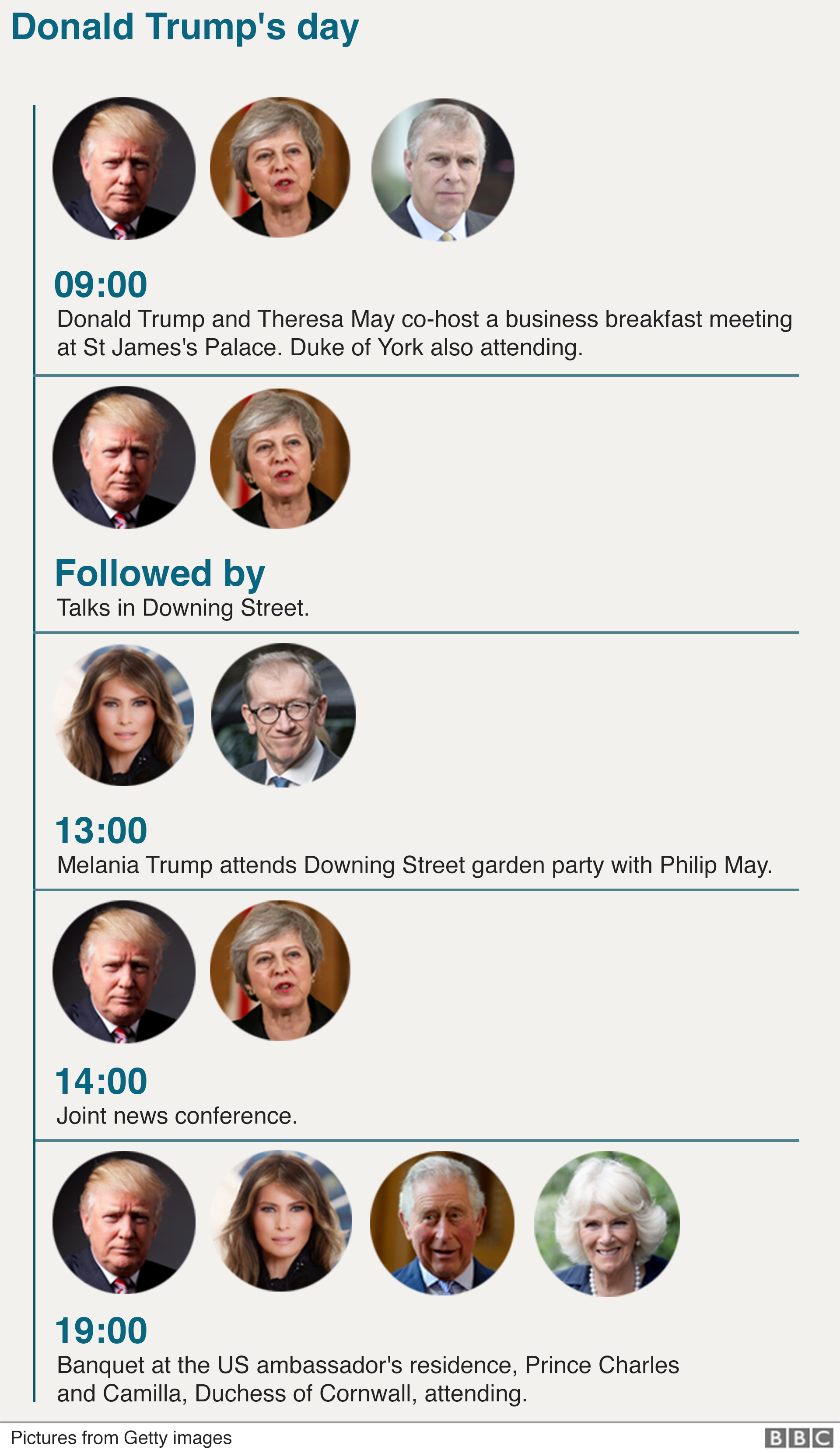
Thousands of people are expected to join protests against Mr Trump's visit in UK cities on Tuesday.
Labour leader Jeremy Corbyn is due to address the London rally in Trafalgar Square, where he will be joined by members of other political parties including the Liberal Democrats and the Green Party.
In the evening, the Trumps will host a dinner at the residence of the US ambassador attended by Charles and Camilla on behalf of the Queen.
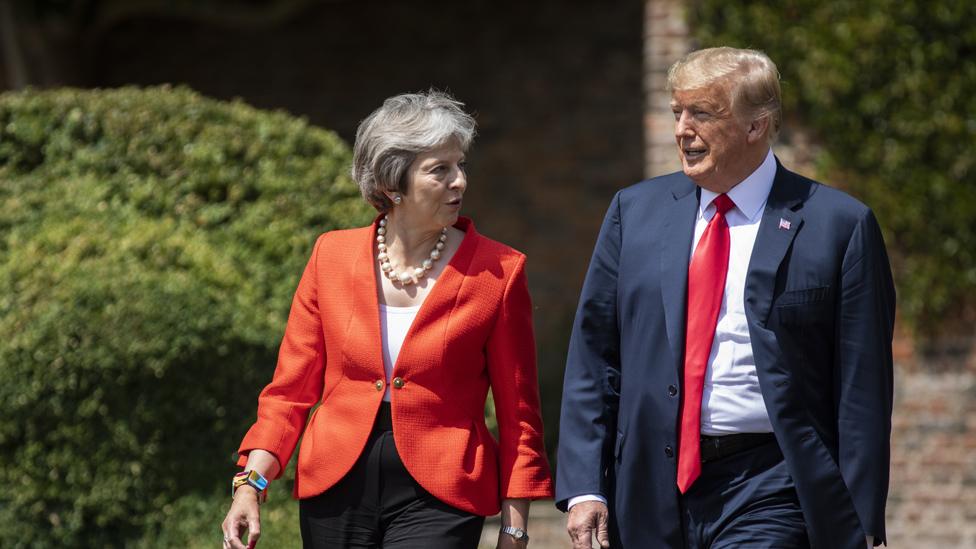
The trip is expected to culminate on Wednesday 5 June with Mr Trump, the Queen and Prince Charles attending the national commemorative event in Portsmouth for the 75th anniversary of the D-Day landings.
More than 300 veterans will be at the ceremony, which will feature musical performances, testimonial readings and military displays.
Following the D-Day event Mr Trump will travel to his hotel and golf resort in Doonbeg, in the Republic of Ireland. He will hold a meeting with Irish premier Leo Varadkar at Shannon Airport.
A visiting leader will sometimes speak at the Houses of Parliament during a state visit, but Commons Speaker John Bercow said on Tuesday he had not received a request for Mr Trump to do so.
The president has suggested he "may" meet Conservative MP and leadership hopeful Boris Johnson and Brexit Party leader Nigel Farage during his visit - both of whom he described as "friends" and "good guys".
Why is the visit controversial?
The prime minister says the visit is a chance for the UK and the US to strengthen their "already close relationship". Talks will cover areas such as trade, investment, security and defence.
But Mr Trump is a controversial figure and many have opposed the visit.
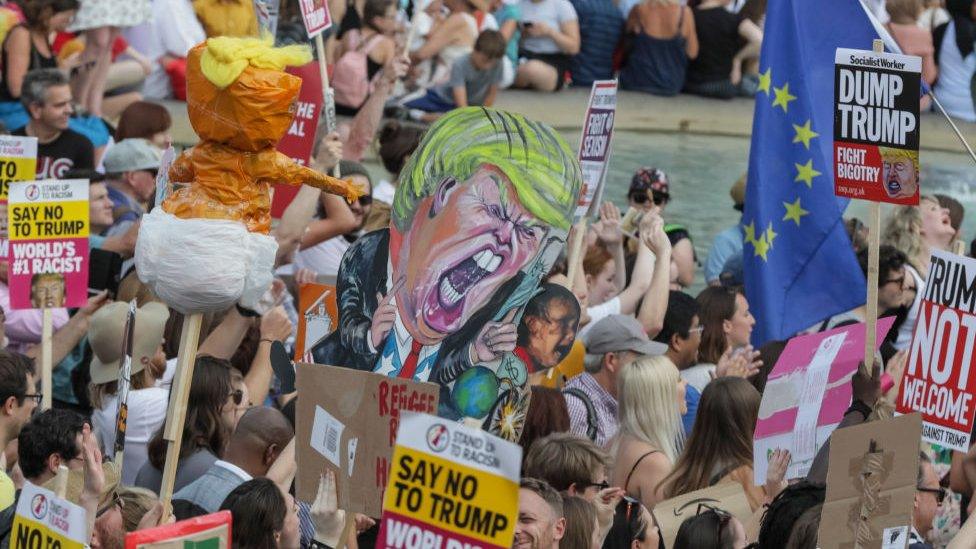
Thousands gathered to protest against President Trump's policies when he visited the UK in 2018
His policies - from the executive order that restricts entry to the US from certain countries, to the wall with Mexico, and his rejection of the Paris climate deal - have provoked criticism, both domestically and internationally.
And that is to say nothing about some of the comments he's made - including outspoken attacks against political opponents, the media, and his critics - and the investigation into his links to Russia.
Labour leader Jeremy Corbyn refused to attend Mr Trump's state banquet, accusing the president of using "racist and misogynist rhetoric", while Liberal Democrat leader Sir Vince Cable also declined an invitation.
Others argue that the US is a key ally of the UK and that Mr Trump should be welcomed accordingly.
What's he brought with him?
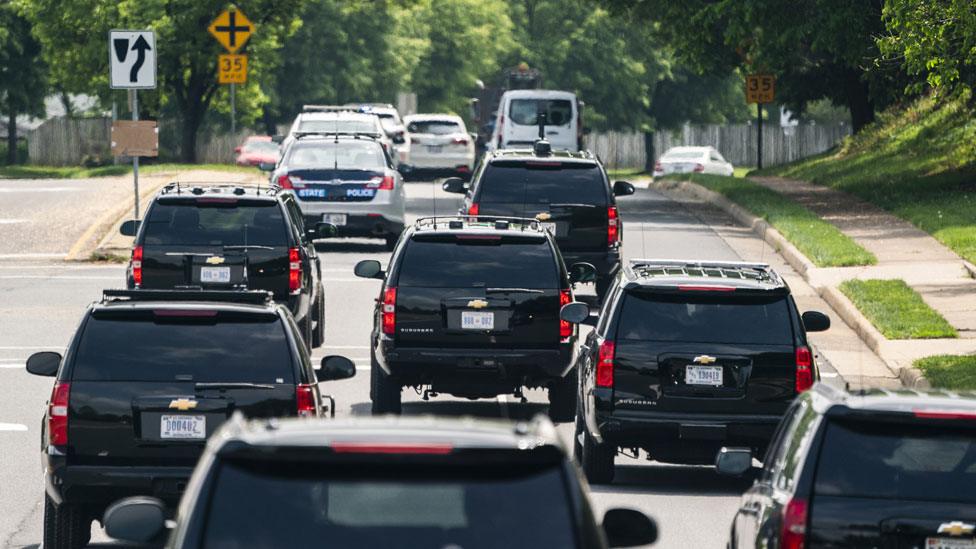
When the president's on the move - you know about it
The security operation surrounding Mr Trump's visit could cost more than £18m.
It is intended to create an impenetrable ring of steel around the US president.
The president arrived in the UK on his customised, high-spec aircraft Air Force One. Inside, the president and his travel companions enjoy 4,000 sq ft of floor space on three levels, with space for conference and dining rooms and a medical facility with an operating table.
The presidential motorcade, which includes two identical limousines nicknamed The Beast and other security and communications vehicles, was flown across ahead of the president by United States Air Force transport aircraft.
In 2018, almost 10,000 officers from the UK were deployed for Mr Trump's trip, with nearly every force in the country providing staff to support the operation.
What happened during his working visit to the UK in 2018?
Dinner, talks and golf: A look back at President Trump's last visit to the UK
It was certainly eventful.
As well as holding talks with Mrs May at her country residence, Chequers, and having tea with the Queen at Windsor Castle, the trip was marked by demonstrations.
Tens of thousands of people gathered in central London to protest against him.
There was also a six-metre "Trump baby" blimp - depicting the president as a nappy-wearing infant - inflated outside Parliament.
And at his golf resort at Turnberry, Ayrshire, one protester paraglided over the hotel as Mr Trump played the course.
Will there be more protests?
Campaigners have claimed they will mobilise "huge numbers" in response to Mr Trump's arrival.
On Monday supporters of the human rights charity Amnesty unfurled five banners facing the US embassy on Vauxhall Bridge, reading "Resist sexism", "Resist racism", "Resist hate", "Resist cruelty" and "Resist Trump".
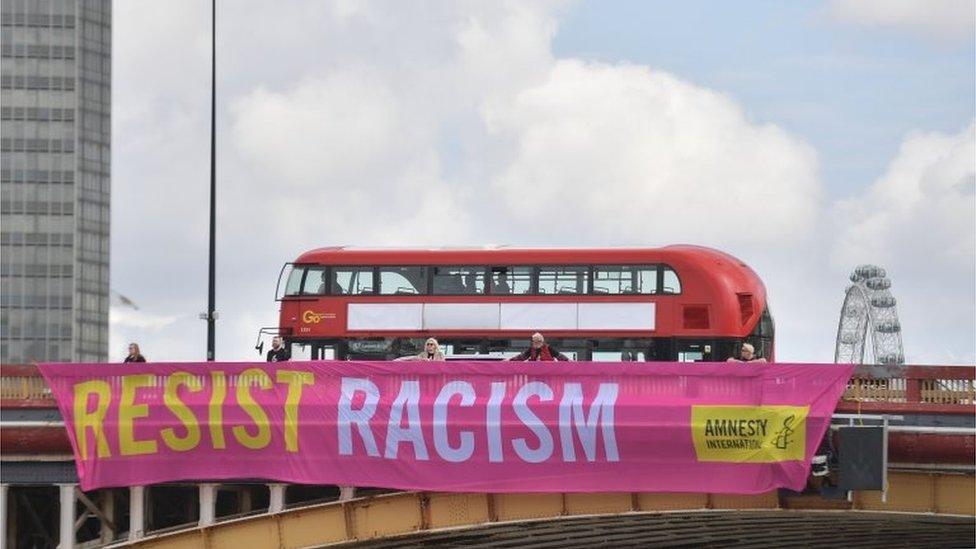
A "national demonstration" in London's Trafalgar Square will start at 11:00 BST on Tuesday, while protests are also planned in Birmingham, Stoke, Sheffield, Glasgow, Edinburgh, Chester, Leicester, Oxford and Exeter.
A 16ft talking robot of Mr Trump sitting on a golden toilet is also expected to make an appearance.
- Published3 June 2019
- Published2 December 2019
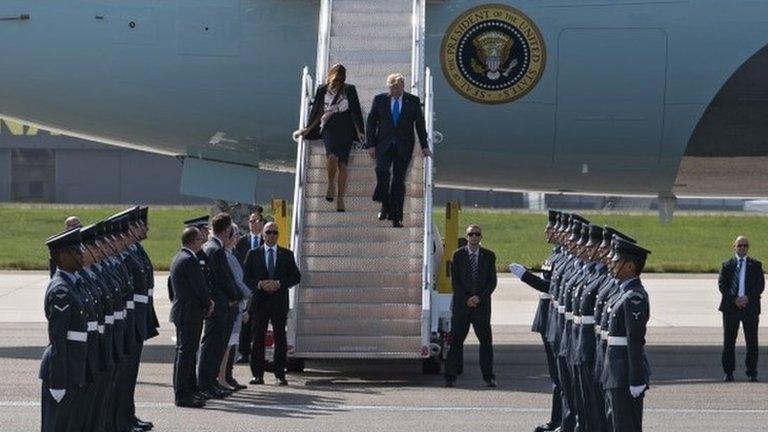
- Published23 April 2019
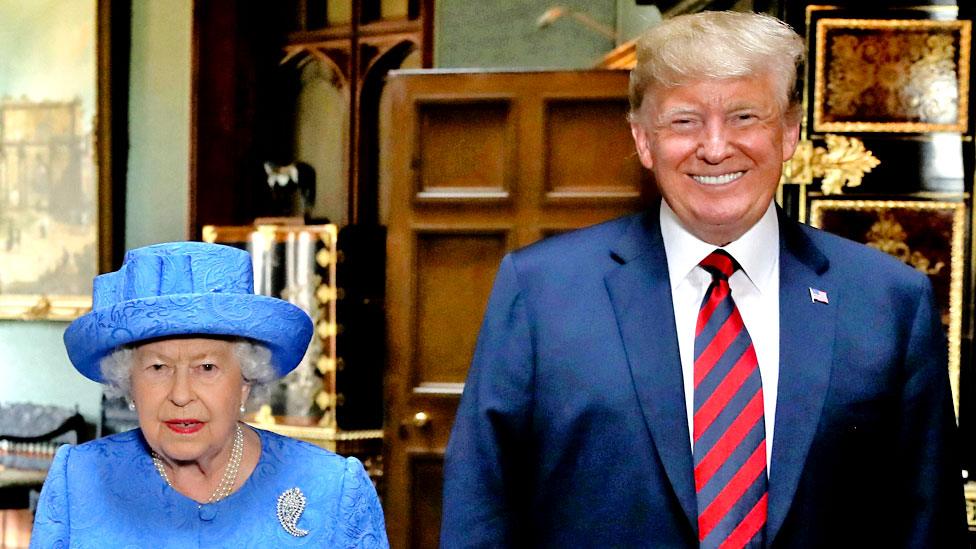
- Published23 April 2019
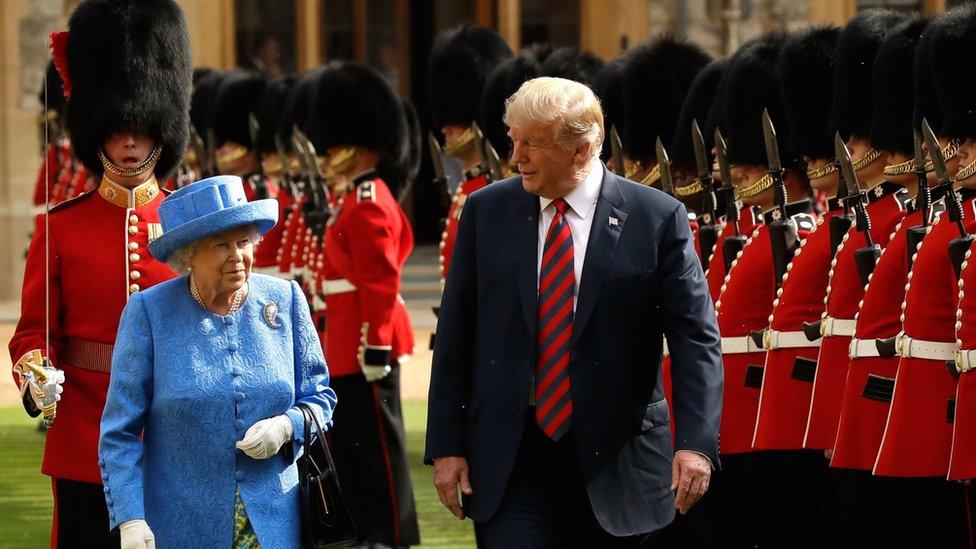
- Published4 February 2019
